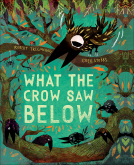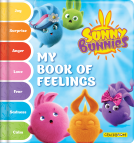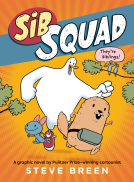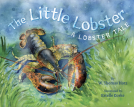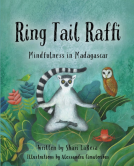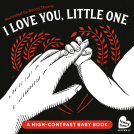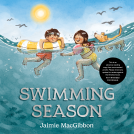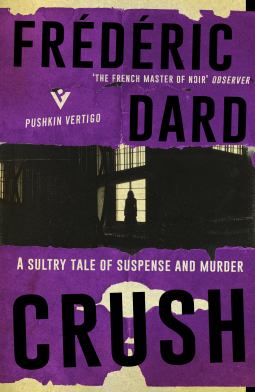
Crush
by Frédéric Dard
This title was previously available on NetGalley and is now archived.
Send NetGalley books directly to your Kindle or Kindle app
1
To read on a Kindle or Kindle app, please add kindle@netgalley.com as an approved email address to receive files in your Amazon account. Click here for step-by-step instructions.
2
Also find your Kindle email address within your Amazon account, and enter it here.
Pub Date Nov 08 2016 | Archive Date Sep 16 2016
Pushkin Press | Pushkin Vertigo
Description
Bored with her mundane factory job, her nagging mother, and her alcoholic father-in-law, 17-year-old Louise Lacroix is captivated by a glamorous American couple who moves to her industrial hometown in Northern France. The Roolands' home is an island of color, good humor, and easy living in drab 1950s Léopoldville—a place straight out of Louise’s dreams.
Louise is thrilled when she successfully convinces the couple to hire her as their maid. But once she is under their roof, their model life starts to fall apart. Painful secrets from their past emerge, cracks in their relationship appear, and a dark obsession begins to grow . . .
Advance Praise
Available Editions
| EDITION | Other Format |
| ISBN | 9781782271987 |
| PRICE | $13.95 (USD) |
Average rating from 14 members
Featured Reviews
This is a very short read that packs a wallop. In just 160 pages it brings all its characters to such vivid life that you will feel like you are in the French town of Léopoldville in the 1950s. Louise is so infatuated with the life of an American couple that she leaves everything behind to become their maid. Once living with them, she realizes that her perfect dream is not all that flawless. Just like a train rushing to crush a car stopped in its tracks, the conclusion is inevitable - and heartbreaking. I'never heard of Mr. Dard, but apparently he was a very prolific writer in his native France. Crush may not be a spectacular thriller, but more of a psychological slow-boiler that will really get under your skin. Very, very good.
 John L, Reviewer
John L, Reviewer
In this story of Thelma and Louise, it's Louise we meet first, through her narration. She's a seventeen year old, telling us of a quite awful and smelly satellite town of Paris she lives in, with the sight of factories and stench of food processing plants keeping her company. She lives at home with her mother, complete with hare-lip, and abusive step-father, and is working at one of those factories until she sees a paradise in their midst – the ever-sunny, sexy and sophisticated life of an American NATO worker and his wife. Impulsively, she asks to be their maid – and indeed moves into the couple's large, messy home. But little does she know what lurks in the shadows in that building, behind their gigantic car and their cute porch swing and al-fresco dining – the unhappiness, and even the tragedy…
This is a book that is kind of belittled by being called a 'crime novel', even if it is definitely one, and one on the short side at that. For one thing there are the characters – Louise is a brilliantly-realised little minx – not too naïve, not really gamine, but definitely someone worth spending time with. She immediately takes to the housework, with a stylish way with flambéing pigeons out of revenge, economy and culinary nous. Her Thelma could come out of the pages of Tennessee Williams, with her choice of clothing as she louchely lounges about the place, drinking and listening to Elvis records. It's no wonder she met her husband on the road to New Orleans. He, Jess, is if anything a little undefined – we don't know (certainly at this remove, sixty years after this might have been current) what he actually does for NATO, but it's the world he lives in – internally and externally – that is of most concern to these pages.
And these pages rattle past – even with the crunching events of practically halfway you won't be too keen on too long a pause before you're back for more. The writing is simple, with a clarity that you wouldn't get from trying any certain, particular style, but it's all there – the humdrum life Louise is leaving, and what she hopes to get from moving in with the others, proves this work has psychological astuteness as well as great story-telling nous. As I suggested, there is a slight element of age to the book – it does date from the late 1950s, after all, but it's been translated very well, and while a little bit of the writing may have been trying to be risqué back then it's not so much that now as still about timeless, base human emotions. I'll leave you to interpret the English title of the book in regard to those emotions, as well as let you in on the French original name being The Villains. I can't tell you which is more accurate, or better, in any regard, as I don't know. I would tell you that I'd think on it – but these tightly effective little pages will be in my mind for several days to come, anyway. Four and a half stars
As with all good noir fiction, this tale is told in first person narrative by Louise, a 17yo French girl, unhappy with her own mundane life, envies a wealthy American couple in the area, and inserts herself into their lives. And until the final twist at the end, you are never quite sure in which direction you are being led.
 J F, Bookseller
J F, Bookseller
A chilling and psychologically dark Fifties tale of suspense of jealousy and murder, that is trademark Frederic Dard from stsart to finish. His depiction of the naivety and gaucheness of Louise, is never less than perfectly realised, as she inveigles herself in the life of the glamorous but tormented couple, the Roolands. In a relatively short novel, Dard ratchets up both the suspense, and depth of character with some lighter vignettes featuring Louise’s awful relatives too. You know you are being led on a path of self destruction from early on, and as you view the self combustion of the characters, you almost feel guilty for watching. Wasn’t entirely convinced by the abruptness, and rather unfinished feel of the ending, but time spent with Dard is never entirely wasted, as the rest of this dark tale testifies. Recommended.
Readers who liked this book also liked:
Carine Laforest;
Children's Fiction
W. Thomas Hotz, illustrated by Estelle Corke
Children's Nonfiction, Outdoors & Nature, Science
Editors of Happy Fox Books
Children's Fiction, Children's Nonfiction, Crafts & Hobbies
